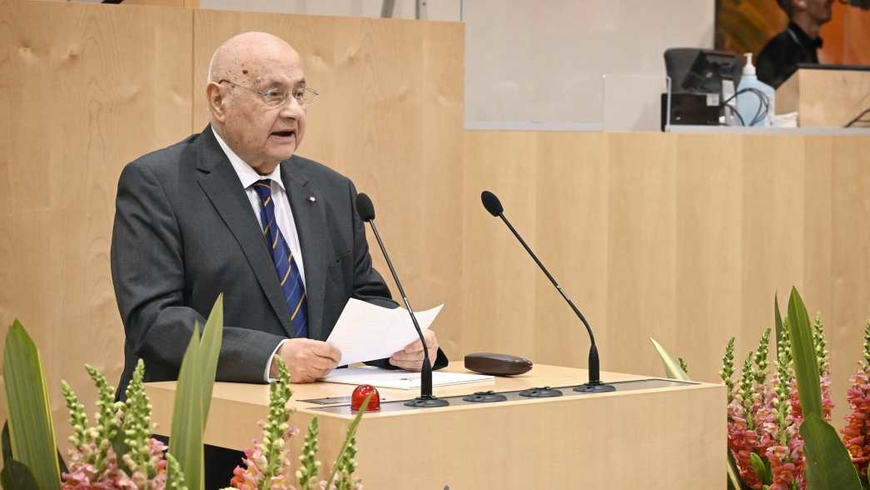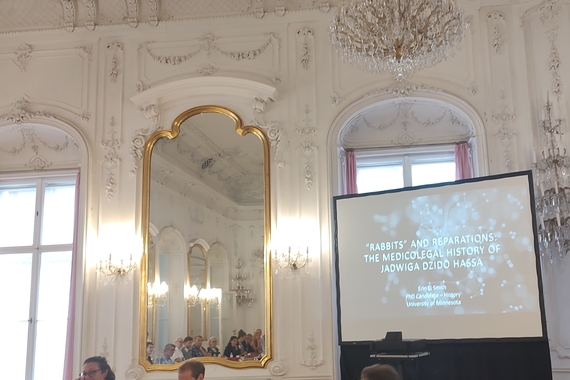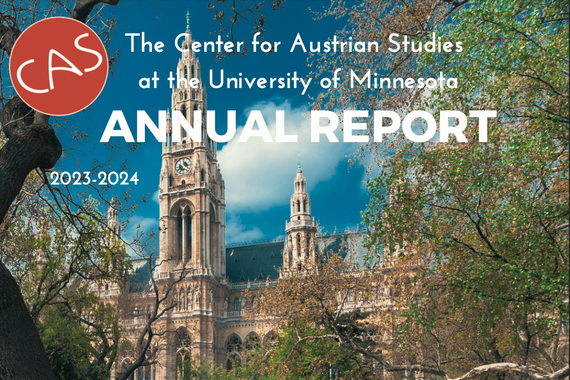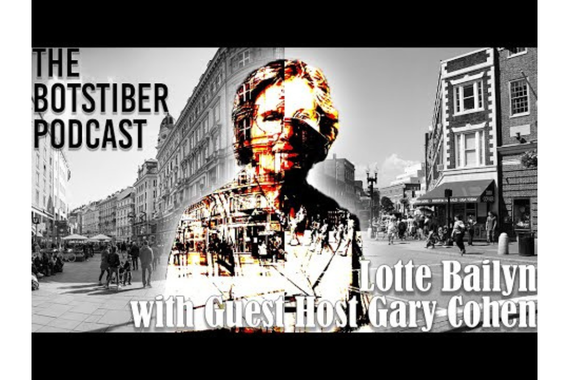CAS Mourns the Loss of Karl Pfeifer
A Fulfilled but Turbulent Life
Karl Pfeifer, one of the last Jewish contemporary witnesses to National Socialism in Austria, passed away on January 6th of 2023. Pfeifer’s life was not only a story of survival, but above all, but one of active participation in political events in at least three countries, and of passion to stand up for what he recognized as just.
An active voice against antisemitism throughout his life and against the authoritarian developments in Hungary over the past several decades, Pfeifer was also one of the few surviving members of the left-wing Zionist movement, which today is marginalized in Israel. Although he left Israel soon after its founding, Pfeifer maintained a close friendship with the Jewish state that he helped establish. Even as he passionately and repeatedly defended Israel when he returned to Austria, he was ultimately disappointed by the political developments there, and saw an acute danger for democracy and the rule of law in the Jewish state from right-wing parties. On December 30th, 2022 Pfeifer posted: "(...) Being a Jew and an Israeli means something completely different than opening one's mouth and preaching hatred against others. Being stuck in the blind alley of narrow-mindedness cannot be seen as adherence to principle. If the most important goal of the Netanyahu government is the impunity of its boss, if it is to limit the powers of the courts and abolish the rule of law to achieve this goal, then one can only hope that the majority of Israelis will wake up and won’t allow to be led by cheaters and criminals."
Pfeifer’s political engagement in Israel, and his disappointment by the shift to the right, are just two aspects of his multifaceted life. Those who heard Pfeifer’s story had the impression that he lived several lives simultaneously. Born in Baden bei Wien in 1928, he soon had his first experiences with Austrian antisemitism, which would shape him throughout his life. In 1938, shortly after the Anschluss, at the age of ten he and his family fled to Hungary. He then witnessed the effects of Hungarian nationalism under Miklós Horthy, who was sympathetic to Germany. Although he learned fluent Hungarian during those years, Pfeifer experienced the antisemitism prevalent in Budapest at the time, and it became clear to him that as a Jew he would never belong to the Hungarian nation. Already an atheist as a teenager, Pfeifer joined Hashomer Hatzair, the left-wing Zionist youth movement, which sought to build a socialist Jewish state in Palestine. In the 1940s, Hashomer Hatzair was also active in the resistance against the Nazis, and taught survival skills that prepared Jewish youth for the escape to the Middle East.
In 1943 and before the German invasion of Hungary, Pfeifer left Europe with one of the last trains of the Children's and Youth Aliyah, and reached the British Mandate of Palestine via Bulgaria, Turkey, Syria and Lebanon. Even in his later years, Karl remembered this flight in various details, with its stopovers in Istanbul and Beirut.
His old friends from the Kibbutz remained some of his closest contacts in Israel. Life on the kibbutz, however, with its hard physical labor, was not really what Karl Pfeifer had envisioned for his socialist future. Soon he was given the opportunity to do a different type of work for the Jewish state as part of the elite Palmach.
At the beginning of the 1950s, Pfeifer returned to Vienna, where he initially lived in the dormitory on Meldemannstraße, the very shelter for the homeless in which Adolf Hitler had developed his antisemitism 40 years earlier. Pfiefer often joked that Austria was good for his health; because he had low blood pressure, all he had to do here was open the newspaper to get it high again.
After an international professional career that took him to countries like Britain, Sweden, Italy, New Zealand and Switzerland, he finally became a journalist very late in life and managed the newspaper of the Jewish Community of Vienna. In 1974 he became a member of Amnesty International, and since 1979 he worked with the Hungarian democratic opposition, about which he published repeatedly. In recent years, he critically and intensively dealt with Hungarian authoritarianism under Viktor Orbán. Pfeifer advocated for his positions with great passion. Differences of opinion regarding migration and Islam, but above all regarding the Israeli-Palestinian conflict, could well lead to many years of personal conflict - also and especially with anti- or non-Zionist members of the Jewish community.
If Karl Pfeifer's personality had not included this fervor and emotionality, and if not for his wife, Dagmar, at his side, he would never have held out in the trial against the German nationalist ideologue (and then influential FPÖ politician) Andreas Mölzer. Mölzer accused Pfiefer of causing the suicide of right-wing professor Werner Pfeifenberger, who had written articles using Nazi undertones and had been charged by the Austrian courts for Nazi activity. Pfeifer then sued. The case was ultimately settled at the European Court of Human Rights in Karl's favor, and with a conviction of the Austrian judiciary.
In the last years of his life, Pfeifer was finally awarded the Golden Decoration of Honor for Services to the Republic of Austria (2018), the Golden Decoration of Honor for Services to the Province of Vienna (2022) and the Golden Decoration of Honor for Services to the Province of Lower Austria (2022), awards that had long been denied to him. In 2022, he also received the Simon Wiesenthal Prize.
Pfeifer and his wife, Dagmar, was an important support for him, and not only on his lecture tours. He traveled the world with her. In 2011, they both came to the USA for lectures and to present the film that we, together with Maria and Ingo Pohn-Lauggas and Daniel Binder, had made about his life [1]. The film was shown in Karl’s and Dagmar’s presence in the Center for Austrian Studies at the University of Minnesota on March 29, 2011, followed by a discussion with students and academics. Afterwards a similar event was hosted by the Austrian Cultural Forum in New York. Even though this was his last transatlantic trip, it was by no means his last voyage. Even in his late 80s, Karl Pfeifer continued to be active internationally. In 2014, he lectured at the Austrian Cultural Forum in London. In 2015, he participated in a discussion in Istanbul at the Ashkenazi Synagogue on Shoah Remembrance Day. Until the COVID-19 Pandemic, when almost all school events were canceled, Pfeifer performed tirelessly as a contemporary witness in school classes. In 2022 he was still participating in public discussions in Germany, Austria and Italy. Pfeifer also continued to write for Hungarian, Austrian, Italian, British, German and Israeli newspapers and book contributions. Public events with him were already planned for 2023.
Karl Pfeifer passed away on January 6th, 2023 in the arms of his wife Dagmar. Vienna loses not only one of the last Jewish survivors, but also a loud and often uncomfortable voice against antisemitism and against the authoritarian developments in Hungary.
1. The documentary can be seen for free on Vimeo.com (https://vimeo.com/124834106) “Somehow in Between - The Life of the Journalist Karl Pfeifer” (German with English Subtitles), created by: Maria Pohn-Lauggas, Mary Kreutzer, Ingo Pohn-Lauggas, Thomas Schmidinger. Cut: Daniel Binder.



